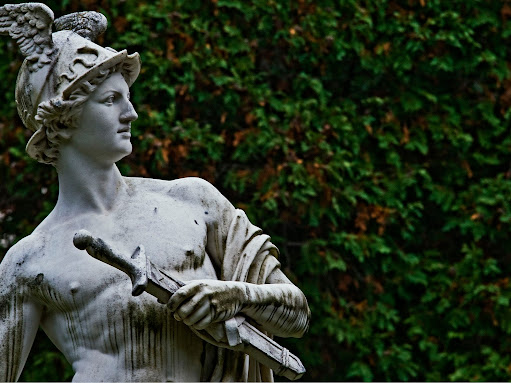Greek Etymology of the "Concept" - Ch. 9 - The Evolution of Deductive Theory by Jose Ortega y Gasset
Ch. 9 Concept as "Term"
In this short chapter by Gasset he brings up the traditional notion of Scholastic logic. The senses provide the material data from which the intellect abstracts a universal concept, then allowing the second and third process of thinking to occur, judgment and reasoning. Gasset adds an interesting note, though, to the traditional formulation. He makes the point that a concept is something which has created boundaries by the mind. It is something we generate by giving a core definition to something to understand it, but it is not exactly the thing itself. Things, themselves, as part of reality are so complex that one can never plumb the depth totally. Reality is like a well of being which continually overflows. Our concepts are like buckets which catch the water and hold it in a particular size and shape ... until either we dump some of water out or get a bigger bucket. This distinction Gasset is going to use later on as a warning not to stultify reality, making it sterile and subservient instead of recognizing its metaphysical depth, from which we can always draw more.
The Thing Itself, the Intuition of the Senses, and the Creation of the Concept
Gasset begins by making a distinction between something being "intuitive" for humans versus "logical." I would probably rephrase intuitive as sensory, or pertaining to the physical senses. By logical he is talking about the abstractness of a "concept." "Logic is a 'way of thinking' in which one pays exclusive attention to the pure relations that exist between concepts as concepts, pretending at the same time that what is valid for these concepts is also valid for the things conceived." In other words, the intuitive senses see the individuality of things. This particular pen with its unique contours, shape, color, etc. While to think logically is to strip away this individuality and to focus on only that which belongs to all pens. "Pen," "...the sum-total of a definition." Then in taking that abstraction and comparing it to other abstractions, the logical process begins. 1
When I encounter the pen with my senses, in its individuality, the details of the pen are always going to exhaust my understanding of it. But when I abstract the concept of pen as the definition which explains what's common in all pens, then I have something which is set, finite, and safe. It is this "extract" which is known as a concept. "The Greeks called the mental extract of a thing its logos, that is, its 'language,' 'what is said of it,' because words do actually represent those mental extracts. 'Table' is the logos of innumerable human artifacts which are very different from each other but which have an identical minimal structure, an identical extract." Again, by creating these stable concepts, one is then able to logically interact with the world of those concepts. 2 This, then, is what "logical theory" or "thinking logically" means. It is to compare these conceptual extracts and combine those which are compatible into a more complex unity. Within logical theory, the concept becomes the "thing," the fundamental unit of reference.
In extracting these concepts, there is a limitation that occurs. Sensory intuition of real things always provides an inexhaustible well from which draw truth. Thus, in reality the individual horses of the world are going to transcend, in their details, the core definition of horse which the concept makes concrete. In fact, Aristotle's for concept, "horos" literally means, "that which is limited." "If ... I use the word 'horse' as the name of the definition of this animal given by zoology, its meaning is limited, it is a limitation of the original meaning, which was un-limited, in-finite, un-defined, diffused, and confused." The concept represents the limitations of what a thing actually is. In Latin, the word "terminus" could be substituted here. A denotation of the end or limits of the thing, as though one were separating out property by markers. 3 The Greeks represented Hermes in these markers as he was the god of the right path. "The god of delimited boundaries and right roads - the right road is called 'method' in Greek - was Hermes ..." The Romans too marked these boundaries, except calling upon the god "Terminus" to help them.
Concept, horos, terminus all represent the limitations that the mind puts on being when it abstractions from its sensual intuitions that extract of definition. This at once gives being a definite boundary and form in the concept, as well as allowing us to then play with it and use it logically. "... I called the concept a thought which is given a label, made official, inventoried, will be understandable. Let us make of terminus, the dependable guarantee of property, the instrument for ensuring the propriety of what we say. Logical thinking uses terms, and therefore should normally talk in terminis." 4
-------------------------
1 - Ortega y Gasset, Jose. The Idea of Principle in Leibnitz and the Evolution of Deductive Theory. (New York: W.W. Norton & Company, 1971). 57
2 - 58
3 - 59
4 - 60





Comments
Post a Comment